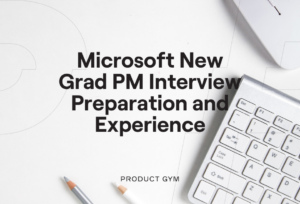Whether you are a first time Product Manager or an experienced veteran, ‘how do you handle conflict’ is a question that any candidate can expect to hear during their interview. How you respond to this question will have a significant influence on what recruiters remember about you coming away from the interview process. This is definitely a critical question to nail; yet there is no singular ‘right’ answer. How do you approach this question in a way that leaves a lasting positive impression?
Why Recruiters Ask the ‘How Do You Handle Conflict’ Interview Question
Before we approach crafting the right answer to this question, it is helpful to consider why recruiters ask it in the first place. The reality of any setting where you have different personalities working together towards a goal is that there will be conflict at some point: it is almost inevitable. As a Product Manager, part of your job will be resolving that conflict between stakeholders as you strive to keep your team running smoothly. Occasionally, you may even have to resolve conflict between yourself and another stakeholder.
Most often, the interviewer is asking this question with two goals in mind. First, they are trying to get a handle on how comfortable you are managing conflict. Second, they want a sample of your approach to resolving it. It is a question that will usually show up in round two of a Product Manager interview — often when you are talking directly to either a Director or VP of product. That makes this an ideal opportunity to make a strong impression and demonstrate some of the real-world interpersonal skills that make a successful PM.
How to Successfully Answer the Conflict Question
As a Product Manager, having an effective strategy for how you handle conflict is critical. But answering this question successfully is not necessarily about telling the interviewer your amazing, magic solution to conflict! On the job as a Product Manager, your day to day operation will be all about making sure you have all the information and understand all the variables before you make a decision. The same mentality should be brought to conflict resolution. Even if you have had experience with a particular strategy previously, what worked at another company might not necessarily be effective in this new environment.
3 Key Conflict Answer Strategies
1. Understand the Context
When developing your answer for how you handle conflict, keep in mind that you need to first try and understand as much of the context as possible. A great place to start is with what your prospective company is already doing. Try to get an understanding of the current strategy and how effectively the company is managing it. To be able to prescribe the best course of action, we need to understand the variables. And that begins with asking questions. Not to stall time or dodge the question, but to be thoughtful and engaged with the unique factors every different company, team, or situation brings to the table.
Not only does this apply to answering the ‘how do you handle conflict’ interview question, but really this goes for the majority of interview questions out there. Before you go ahead and make a suggestion, get as much clarity and context as you can. If you start making suggestions without all the information and just immediately respond with a strategy that they’ve already tried — or one that does not make sense with the company culture — this could be a red flag for potential employers. At worst, you risk coming across as incompetent. At the very least, you miss out on an opportunity to demonstrate great observation skills and develop a rapport with the person conducting your interview.
2. Include Nuance
The other factor to keep in mind when explaining your strategy for handling conflict is that most real life situations are very fluid and require nuance. Answering too quickly with a response that is generic and off the cuff can come across as unrealistic and weak. Avoiding things like absolute statements will help you avoid unintentionally locking yourself into a one-size-fits-all answer. Your solution realistically would depend on the details; for example, an issue between two software developers vs. one that is between a software developer and a UX designer will require two different approaches to communication and conflict resolution.
3. Be Honest About Your Limitations
Talking as if you have been on the job for six months already is not necessarily a good thing in this situation! The reality is that you will not know the specifics of your prospective company culture, and without knowing all the details you won’t be able to come up with the perfect response. Don’t be afraid to acknowledge as much — speak honestly about the limitations of your answer without the experience and context that a real life conflict provides. This is also a great way to force the interviewer to engage with you and really pay attention to what you are saying.
Now that you understand some of the key factors to include and some red flags to avoid, you can start to build an outline of your response that can flex as needed and appropriately build fail safes into your answer. Start by asking questions and gathering information, and really listen to the information you receive. Save the confident bravado and absolute statements for another time. Instead, opt for a conversational tone that is confident but grounded. A successful response will be thoughtful and engaged in the context of your prospective employer, and it will clearly communicate the flexible nature of your answer depending on the situation.
Master Every Product Manager Interview Question
How you answer the ‘how do you handle conflict’ interview question is not only a gauge of your ability to problem solve, but also a great way for recruiters or hiring managers to determine your ability to mesh with the team on an interpersonal level. You should be prepared and ready to give a response that is concise and well thought-out.
If you are still unsure of how to apply these strategies to your own answer, or if you just want to make sure that you are putting your best foot forward, schedule a free call today with one of our senior advisors. They will be able to look at your current answers and help you to find where you could improve, and how you can start nailing questions like this so you can start to turn interviews in to job offers.




